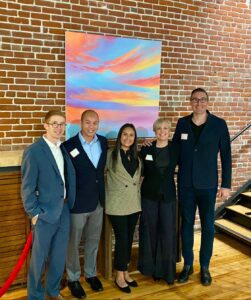Written by Maria Picone, TREND Community
Ten years ago, my daughter was born with a rare, complex disease known as Prader-Willi syndrome (PWS). PWS is best known for causing insatiable hunger (hyperphagia) that can lead to life-threatening obesity, but it’s a complex disease that impacts many other aspects of a person’s life. It can cause physical symptoms such as cataplexy (sudden muscle weakness), hypotonia, balance and coordination issues, and motor delays. It can also cause significant mental and behavioral dysfunction.
Like any parent, I want my daughter to live as healthy and fulfilled of a life as possible. When she was a baby, my husband Chris DeFelice and I worked tirelessly with her on learning to walk, as we knew that it is frequently a delayed milestone for children with PWS. In conversations with other PWS caregivers online, I learned that many in the community were trying vitamin B12 supplements to improve their children’s balance and motor skills. I wanted my daughter to be able to try B12, but her doctors pushed back. So, I worked with her physical therapist to create an experiment. We found that during the times she was actively taking B12, the number of steps she was able to take dramatically increased; when she went off the supplement, the improvements ceased. Now armed with intentionally gathered data that built on my anecdotal experience, the doctors were more willing to engage with me in conversations about this particular exploratory intervention.
This experience, along with our backgrounds in programming and data analytics, led my husband and I to co-found TREND Community, a data analytics company that turns the conversations of rare, chronic, and emerging disease communities into actionable insights. Although we were able to advocate for our daughter by turning our patient and caregiver experiences into data that the medical community would pay attention to, not every rare disease parent knows how or is able to do so.
At the same time, we watched clinical trial after clinical trial for PWS fail. I believe these trials were failing because of a fundamental lack of understanding of this extremely rare disease. As a scientific and medical community, we haven’t had optimal outcome measures designed for PWS because we have been focused on individual disease symptoms rather than the disease burden as a whole.
We needed a more holistic understanding of PWS to bridge the gap and create effective, fit-for-purpose outcome measures. And I knew exactly where we could find the data to fill those gaps. I turned to the active and engaged PWS patient and caregiver online community. My husband and I started our data gathering with community surveys about common PWS symptoms, which we continually updated and expanded based on organic conversations we were listening to in the PWS advocacy social media groups. In this way, we were able to find out whether any one patient’s anecdotal symptom was in fact being experienced by a significant percentage of the community.
Eventually, the surveys morphed into the TREND Community platform, which has been a useful tool to collect real-world evidence on disease burden and progression. Using the platform, we collate social media conversations among caregivers in invitation-only, advocacy-led Facebook groups; map language of personal experience to medical/scientific terminology; handle all data with the safeguards applied to protected health information; and publish key findings in scientific literature or at medical conferences.
Through TREND Community, we learned about a number of unmet needs and underrecognized aspects of PWS, including the connection between the disease and narcolepsy, as well as serious behavioral and mental health issues. We developed a PWS Community Voice Report, which helped inform the community’s externally led, patient-focused drug development meeting with FDA. This meeting aimed to educate regulators and industry about the most important aspects of PWS that need to be addressed through innovative treatments. Our community is one of a small percentage of rare diseases to have an FDA-approved therapy, but we desperately need more.
Everything we’ve done with TREND Community started with PWS. We were driven to do whatever we could to learn about our daughter’s disease so that she could live her best possible life. We’ve now expanded beyond PWS to many other underserved disease communities.
Patients and caregivers—particularly in rare disease communities in which so much remains to be learned about disease burden and progression—are a wealth of knowledge and insight. Their experiences should not be dismissed as merely anecdotal. TREND Community insights are validating these contributions so that regulators and drug developers can take action accordingly.
With more than 95% of rare diseases being without an FDA-approved therapy, our scientific community should leverage every resource available to help these populations. We all have the common goal of improving quality of life for people living with rare diseases.



